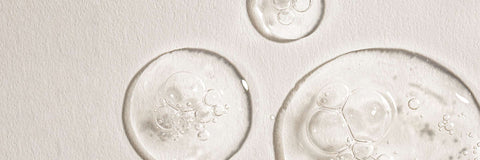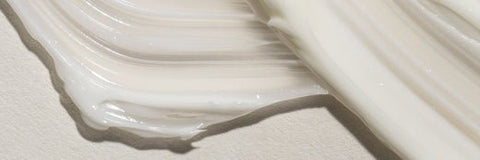Is there anything more annoying than cleaning out the fridge to find that half the food in it has spoiled? Well, without some type of preservative, that’s exactly what would happen to your skin care products and cosmetics. Skin care products, especially natural skin care products, have to be preserved in some way, otherwise, we’d be buying new skin care as often as we buy food.
Today’s preservatives are not what you may think they are. At Fleur & Bee, we’re committed to clean, non-toxic skin care -- that means no parabens, sulfates, phthalates, silicones, GMOs, artificial fragrances, gluten, or dyes of any kind. That’s why we’ve gone out of our way to make sure the preservatives we use--like phenoxyethanol--are safe.
Read on to learn more.
IN A NUTSHELL
Ingredient Category: Preservative
Main Benefit: Preservatives are used to help keep harmful mold and bacteria from growing on your products. When used in concentrations of less than 1%, phenoxyethanol is considered safe.
Find It In: Fleur & Bee Product Collection (with the exception of Prince Charcoal Detox Mask).
What is Phenoxyethanol in Skin Care? Is it Safe?
Phenoxyethanol in skin care is used as a preservative. Although the kind of phenoxyethanol used in skin care is synthetic (known as “nature identical,” it mimics the natural version exactly), phenoxyethanol is actually found in nature, specifically in green tea and chicory. It ensures that yeast, mold, and bacteria don’t develop and ultimately, end up on your skin.
Technically, phenoxyethanol forms via a reaction between phenol (EU) and ethylene oxide (EU). Aside from acting as a preservative, it’s even been used in vaccines. You’ll find phenoxyethanol in everything from eye creams to moisturizers, so it’s a good idea to understand what it does and doesn’t do.
Is Phenoxyethanol Safe?
Yes, phenoxyethanol is safe. According to the Cosmetic Ingredient Review, when used in concentrations of 1% or less, phenoxyethanol in skin care is safe. This is also the same standard used by the European Commission on Health and Food Safety.
Many of the studies that have been published in which phenoxyethanol is found to be an irritant are doing so in reference to much larger concentrations. In small concentrations of 1% or less, it’s incredibly beneficial; while in enormous quantities over long periods of time, it could cause some issues. The truth is, no ingredient– no matter how natural or free of chemicals– can be completely ruled out as an irritant on the skin of every single person on the planet.
That said, phenoxyethanol should not be ingested by babies or children under three years old, so make sure not to apply any skin care products with phenoxyethanol on areas of the body where a baby might suckle or lick the skin.
What do Preservatives Do?
Preservatives in skin care prevent the growth of yeast, mold, and bacteria. Just like food, skin care, make-up, and fragrances all have a certain shelf life and without some kind of preservative, that shelf life would be very short.
Benefits of Phenoxyethanol
There are many benefits to using phenoxyethanol as a preservative in skin care, not the least of which is that it extends the shelf life of products drastically. Without a preservative like phenoxyethanol, most skin care products would be useless in a very short period of time. They could also be potential carriers of bacteria and fungi to the skin, causing visible infections.
Phenoxyethanol is also chemically stable, which means it won’t alter the state or fragrance of your skin care. In addition, it is biodegradable.
But perhaps most importantly– phenoxyethanol is safer than other preservatives, such as parabens, which may mimic estrogen and therefore increase the chance of breast cancer. It’s also considered to be safer than formaldehyde, another popular preservative. There are actually a whole slew of chemical preservatives that release or form formaldehyde; for example: glyoxal, sodium hydroxymethylglycinate, and polyoxymethylene urea. Formaldehyde is thought to be a very dangerous carcinogen that causes leukemia, brain cancer, and rarer cancers.

Side Effects of Phenoxyethanol
There is some data that suggests that phenoxyethanol can cause damage to the Central Nervous System and organ damage; but as we mentioned above, that data usually stems from studies that are looking at very large concentrations. For that reason, they’re usually not applicable to how phenoxyethanol affects people when used in skin care.
That said, there is some evidence that even in a small concentration some people experience irritation from it, a fact that is probably true of just about any skin care ingredient you could name. Although this seems to be more rare, there is a possibility that hives are also a side effect.
Phenoxyethanol Safety
If you’re someone who is prone to irritation or has sensitive skin, do a small patch test before applying a product with phenoxyethanol to make sure you won’t have an adverse reaction. You can also check with your dermatologist to see if there is any reason you should stay away from it.
Phenoxyethanol Dangers
As far as phenoxyethanol dangers go, what does seem to be true is that babies and children under three should not be ingesting any phenoxyethanol. In that case, it can cause damage to the central nervous system, which is why we strongly discourage use of phenoxyethanol if there’s a way a baby or toddler can ingest it (i.e. via breastfeeding).

Phenoxyethanol vs. Parabens and Other Preservatives
Since not having preservatives in skin care products is potentially dangerous), not including them in skincare products isn’t really an option. That’s why the smartest thing to do is to make sure you’re using the safest preservatives possible.
Although the phenoxyethanol that’s used as a preservative in skin care and cosmetics is actually a synthetic version, phenoxyethanol does actually
occur in nature, specifically in green tea and chicory. The Cosmetic Ingredient Review has determined it’s safe for use in skin care in small concentrations. It is also permitted in cosmetics in the EU and Japan in concentrations of 1% or more.
Parabens perform essentially the same function as phenoxyethanol but are potential carcinogens (meaning they could cause cancer). The same goes for formaldehyde.
For those reasons, phenoxyethanol is a much better choice.
Frequently Asked Questions About Phenoxyethanol
As a bit of an up-and-comer in the skin care world, phenoxyethanol is an ingredient about which people have a lot of questions: What does it do? Is it safe? We’ll try to answer a few of those questions here.
What does phenoxyethanol in skin care do?
Phenoxyethanol acts as a preservative, extending the shelf life of skin care and cosmetics by preventing the formation of mold, bacteria, and yeast.
Is phenoxyethanol safe to use in skin care?
Generally, yes. Although there is research that says phenoxyethanol can cause irritation– and in some cases, even hives– it’s important to note that those studies are generally looking at large concentrations of phenoxyethanol used over long periods of time. Phenoxyethanol in skin care in the EU and Japan is approved in concentrations of 1% or less. In these small concentrations, phenoxyethanol is considered safe.
Has the FDA approved phenoxyethanol in skin care?
The FDA has not banned phenoxyethanol in skin care (and the FDA requires that all cosmetics must be safe to use as directed). The Cosmetic Ingredient Review in the U.S. has determined phenoxyethanol to be safe in concentrations of 1% or less. It has also been approved for use in the EU and Japan in the same concentrations.
Is Phenoxyethanol natural?
Phenoxyethanol is found in nature (specifically in green tea and chicory), although the kind of phenoxyethanol used in skin care is manufactured synthetically and is “nature identical.”
Why is having a preservative in skin care important?
Preservatives protect your skin care products from developing mold and bacteria. They often get a bit of a bad rap; but the truth is, without them, skin care and cosmetics could potentially be dangerous to use. That’s why the use of safe, effective preservatives in skin care is so important.
So, that’s the lowdown on phenoxyethanol. When it comes down to it, it’s a much better choice than other preservatives and makes your skincare products safe to use.




